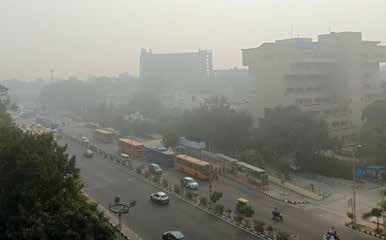A recent analysis conducted by the Centre for Science and Environment (CSE) reveals that the non-compliance of thermal power plants in Delhi-NCR with emission standards is a major contributor to the region’s air pollution. The study focuses on the emissions of particulate matter, nitrogen oxide, and sulphur dioxide from the 11 thermal power plants in the area.
The data utilized for the analysis is extracted from the environmental status reports of these plants, available on the website of the Central Electricity Authority (CEA), a technical arm of the Union Ministry of Power, covering the period from April 2022 to August 2023.
The findings indicate that thermal power plants are responsible for approximately eight percent of the PM2.5 pollution in Delhi-NCR. Anumita Roychowdhury, the Executive Director of Research and Advocacy at CSE, emphasizes the critical role of compliance with emission standards for achieving clean air and safeguarding public health. She points out the challenges faced by these plants in meeting standards, primarily due to continuously shifting compliance deadlines.
Despite multiple deadline extensions and revised categorizations by the Union Environment Ministry, many power plants in the region are struggling to adhere to prescribed norms for emissions of nitrogen oxide, sulphur dioxide, and particulate matter, according to the CSE report.
The Union Environment Ministry initially established stringent emission standards for coal-based power plants in December 2015, requiring compliance within two years. Subsequently, a five-year extension was granted to all power plants except those in Delhi-NCR, which were given until 2019 to comply due to the region’s elevated pollution levels. However, except for Dadri TPP and Mahatma Gandhi TPP, all NCR plants failed to meet the revised deadline and continued to operate in violation until another extension was granted in March 2021.
The ministry then categorized all power plants, including those in Delhi-NCR, into three groups (A, B, and C) based on criteria set by the Central Pollution Control Board (CPCB). New deadlines were set accordingly: Category A plants must meet SO2 emission norms by December 31, 2024; Category B plants have until December 31, 2025, and Category C plants are required to comply by December 31, 2026.
The CSE report highlights that, almost six years after the first deadline, three plants in the NCR—Harduaganj TPP, Panipat TPP, and Guru Hargobind TPP—are still reporting very high suspended particulate matter emissions. Despite the relaxation of nitrogen oxide norms and deadlines, four plants in Haryana and Punjab—Panipat TPP, Rajiv Gandhi TPP, Yamunanagar TPP, and Guru Hargobind TPP—have exceeded NOx norms several times during the reporting period.
All coal power plants in NCR have reported SO2 emissions up to three times over the prescribed limits. While Mahatma Gandhi TPP remains within the limit for sulphur dioxide emissions, Dadri TPP, equipped with sulphur dioxide control equipment (FGD), reported high SO2 readings 86 percent of the time during the reporting period. Researchers suggest that either the FGDs at Dadri TPP are malfunctioning or have insufficient capacity, or the coal used has very high sulphur content.
DD Basu, former director of the CPCB, emphasizes the importance of controlling SO2 emissions, as they can convert to sulphates, posing greater risks to health and the environment by forming fine particulate matter.
